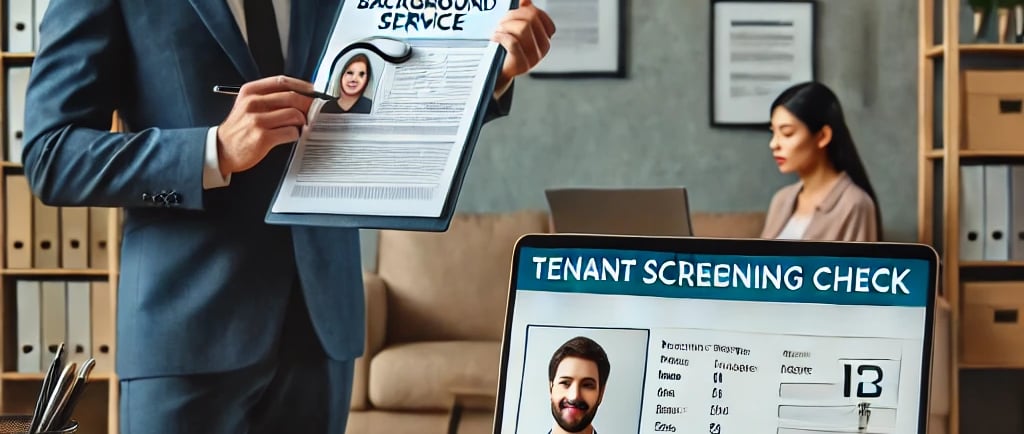How to Conduct a Background Check on a Potential Tenant
Discover how to conduct a thorough background check on potential tenants with our comprehensive guide. Learn essential steps, legal considerations, and how private investigators can enhance your tenant screening process. Ensure reliable tenants and protect your property investment today!
PRIVATE INVESTIGATION FLORIDA PROPERTY MANAGEMENT BACKGROUND CHECK


How to Conduct a Background Check on a Potential Tenant
In the world of property management, ensuring you have reliable and trustworthy tenants is crucial for the security and profitability of your rental properties. Conducting a thorough background check on potential tenants is an essential step in this process. This article will guide you through the process of conducting a background check on potential tenants, providing you with practical tips, real-life examples, and valuable insights.
Why Conduct a Background Check on Potential Tenants?
Before diving into the how-to, it's important to understand the reasons behind conducting a background check. As a landlord or property manager, your goal is to:
Ensure Reliability: Confirm the tenant's ability to pay rent on time.
Maintain Property Safety: Avoid renting to individuals with a history of criminal behavior.
Protect Your Investment: Prevent potential property damage by verifying past rental behavior.
A comprehensive background check helps you achieve these goals and mitigates the risks associated with renting out your property.
Step-by-Step Guide to Conducting a Background Check
1. Obtain the Tenant's Consent
Before starting any background check, you must obtain written consent from the prospective tenant. This is not only a legal requirement but also a best practice that ensures transparency and trust.
H3: Drafting a Consent Form
Create a consent form that clearly states what information you will be checking, including credit history, criminal records, and rental history. Have the tenant sign and date the form.
2. Verify Identity and Personal Information
Begin by verifying the tenant's identity and personal information. This includes:
Full name
Date of birth
Social Security number (SSN)
Current and previous addresses
H3: Checking Identification Documents
Ask for a copy of the tenant's government-issued ID, such as a driver's license or passport. This helps confirm their identity and ensures the information provided is accurate.
3. Evaluate the Tenant’s Credit Report
A tenant's credit report provides insights into their financial responsibility and reliability. It includes their credit score, payment history, and outstanding debts.
H3: Accessing Credit Reports
You can obtain a credit report from one of the major credit bureaus: Experian, Equifax, or TransUnion. Some tenant screening services offer comprehensive reports that include credit information.
4. Conduct a Criminal Background Check
Safety is a top priority for any landlord. A criminal background check reveals any past criminal activities or charges against the tenant.
H3: Utilizing National and Local Databases
Use national and local databases to search for criminal records. Many tenant screening services provide access to these databases and streamline the process.
5. Verify Employment and Income
Confirming a tenant's employment and income ensures they have the financial stability to pay rent consistently.
H3: Contacting Employers
Request recent pay stubs or an employment verification letter. Contact the employer directly to verify the tenant's employment status and income.
6. Check Rental History
A tenant's rental history provides valuable insights into their behavior as a renter, including timely rent payments and property care.
H3: Contacting Previous Landlords
Reach out to previous landlords to inquire about the tenant's rental history. Ask specific questions about their payment behavior, any property damage, and overall conduct.
Real-Life Example: The Importance of Thorough Background Checks
Consider the case of Jane, a landlord who owns several rental properties. Jane once rented her property to a tenant without conducting a thorough background check. The tenant had a poor credit history and a record of late rent payments, which Jane discovered too late. The tenant eventually defaulted on the rent, causing financial strain and requiring an eviction process. This experience highlighted the importance of a comprehensive background check for Jane.
Using Tenant Screening Services
Tenant screening services simplify the background check process by providing comprehensive reports that include credit checks, criminal background checks, and rental history. Some popular tenant screening services include:
MyRental
TransUnion SmartMove
RentPrep
AppFolio
These services offer various packages to suit different needs and budgets, making the background check process efficient and reliable.
Legal Considerations
When conducting background checks, it's essential to comply with legal requirements to avoid potential lawsuits and penalties.
1. Fair Credit Reporting Act (FCRA)
The FCRA regulates the collection and use of consumer information, including credit reports. Ensure you adhere to FCRA guidelines by obtaining written consent and providing adverse action notices if needed.
2. Anti-Discrimination Laws
Comply with federal, state, and local anti-discrimination laws, such as the Fair Housing Act, which prohibits discrimination based on race, color, religion, sex, national origin, familial status, or disability.
Common Challenges and How to Overcome Them
1. Incomplete Information
Sometimes, tenants may provide incomplete or inaccurate information. To overcome this, cross-verify information using multiple sources and request additional documentation if needed.
2. False References
Occasionally, tenants may provide false references. To avoid this, independently verify contact information for previous landlords and employers.
3. Delayed Responses
Obtaining information from previous landlords or employers can sometimes be delayed. To mitigate this, start the background check process early and follow up promptly.
Conclusion
Conducting a thorough background check on potential tenants is a crucial step in property management. By following the steps outlined in this guide, you can ensure you select reliable and trustworthy tenants who will maintain your property's safety and financial stability. Remember to use tenant screening services, comply with legal requirements, and stay vigilant in verifying information to make informed decisions.
By investing time and effort in conducting comprehensive background checks, you protect your investment and create a positive rental experience for both you and your tenants.
SEO Optimization Analysis
Keyword: "private investigation": Not directly mentioned, but implied through the investigative steps described. Adding a section or references to private investigators can enhance relevance.
Keyword: "tenants": Frequently mentioned throughout the article.
Keyword: "background checks": Frequently mentioned and central to the article.
Other relevant terms: "tenant screening," "rental history," "credit report," "criminal background check," "employment verification," "property management."
Adjustments for Optimization
Add references to private investigators where relevant to emphasize their role in conducting thorough background checks.
Ensure keyword density for "private investigation" and "tenant screening" is sufficient.
How Private Investigators Can Assist with Tenant Background Checks
Private investigators play a crucial role in conducting thorough background checks on potential tenants. Their expertise in gathering and verifying information can provide landlords with additional peace of mind.
Benefits of Hiring a Private Investigator
Comprehensive Checks: Private investigators have access to specialized databases and resources that can uncover hidden details.
Expert Analysis: Their experience allows them to interpret complex information and identify potential red flags.
Time-Saving: They can handle the investigative work, saving landlords time and effort.
When to Consider a Private Investigator
If you have high-value properties or have had issues with tenants in the past, hiring a private investigator for background checks can be a wise investment. They can provide a more in-depth analysis and ensure you make informed decisions.
By integrating the expertise of private investigators into your tenant screening process, you can enhance the reliability of your background checks and protect your property investment effectively.


